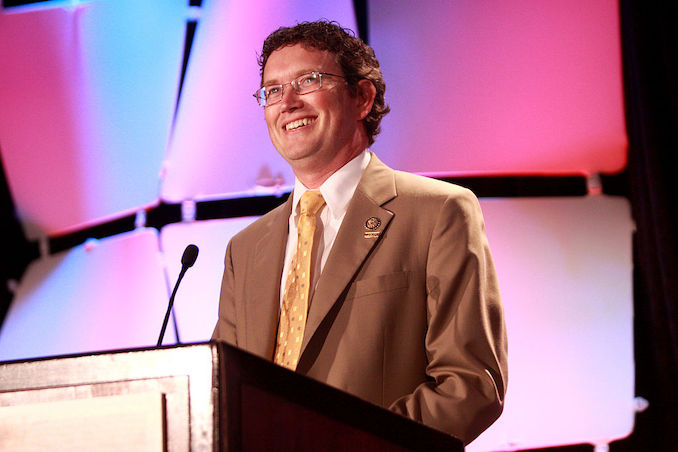 Photo by Gage Skidmore
Photo by Gage Skidmore
[CAF Note: I am a supporter of Congressman Massie. I believe his efforts are critical to the future of our country and the future of small farmers and ranchers and local food markets in the United States. Please support him and his efforts—your help is critical!]
By Pete Kennedy, Host of the Solari Food Series
For the first time since he was initially elected to the House of Representatives, Thomas Massie has a challenger for the Republican nomination to run for Congress in Kentucky's fourth district. The winner of the May 19 Republican primary for the district seat is expected to take the general election in November. Massie not only represents Kentucky's fourth district; he also serves as the congressman for the local food movement. If his primary opponent, attorney Todd McMurtry, were to be successful, local food would lose its biggest champion in Congress. It is suspected that significant sums of money are coming from outside the district to defeat the four-term congressman. Massie is the rare politician who goes about his business as if the United States of America is a constitutional republic—something that is anathema to the ruling establishment.
Massie, a cattle farmer himself, is the lead sponsor of two different pieces of legislation that would be a boon for small farmers and local artisan food producers. The first, the Processing Revival and Intrastate Meat Exemption Act (HR 2859), known as the PRIME Act, addresses arguably the greatest weakness in the local food system, which is the lack of slaughterhouse infrastructure. If the PRIME Act passed into law, States would have the power to allow the sale of meat by the cut that was slaughtered and processed at a custom facility. There are areas around the country where small farmers have to book a year in advance to get their animals slaughtered due to the shortages of inspected slaughterhouses throughout the U.S. The ability to sell meat from animals slaughtered at a custom facility can also lead to lower prices for quality meat; custom facilities aren't subject to burdensome requirements such as HACCP that federally and state-inspected slaughterhouses are. With the meat shortages this country is facing in the wake of the Covid-19 crisis, passage of this bill is more important than ever.
Massie is also the lead sponsor of the Interstate Milk Freedom Act (HR 5410), legislation that would allow the interstate transport of raw dairy products for human consumption from one State where those products are legal to sell or distribute to another State where those products are also legal. Thanks to an ill-conceived thirty-year-old ban on raw milk, the only raw dairy food currently legal in interstate commerce is cheese aged at least 60 days. Passage of HR 5410 could trigger legalization on the State level of other value-added raw dairy products such as butter, cream, and yogurt; most States currently have only legalized the sale or distribution of milk and unaged cheese.
The PRIME Act and the Interstate Milk Freedom Act don't have the support to pass as stand-alone bills, but there is a chance of passage for both of them through their inclusion in the Farm Bill. There are other strong supporters of the bills in Congress, such as Representative Chellie Pingree (D-ME) and Senator Rand Paul (R-KY), but no one has the commitment and savvy to move the legislation forward like Massie.
In 2014, Massie was one of the principals in including a provision in the Farm Bill that authorized States to conduct pilot research projects on hemp growth, cultivation, and marketing—a provision that helped lead to the legalization of interstate hemp sales in the 2018 Farm Bill. In 2018, Massie was mainly responsible for the House voting on whether to include the Interstate Milk Freedom Act in the Farm Bill. Even though the House voted against inclusion by a wide margin, with the increasingly better track record of raw milk for safety and the accelerating decline of the conventional dairy industry, that result could be reversed in future Farm Bills.
Much is at stake for small farmers, local artisans, and consumers of nutrient-dense food in the Republican primary in Kentucky's fourth district. Those interested in more information on the Massie re-election campaign can go to his website (www.thomasmassie.com) and the Facebook page (https://www.facebook.com/ThomasMassieforCongress).
Related Reading:
2017- The Wholesome Meat Act Hustle
2015- The Wholesome Meat Act of 1967: Disaster for Small Slaughterhouses from the Start
